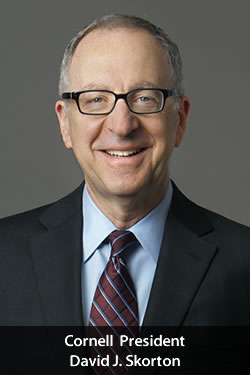
Cornell & Technion Collaborate on New College at Roosevelt Island
By Dr. Joan Baum
 It’s wonderfully apt that David J. Skorton, the president of Cornell University, says he’s “heartened” by the outpouring of support he’s been getting ever since Mayor Michael Bloomberg announced the establishment of The Technion-Cornell Institute of Innovation (TCII) this recently. “Heartened” indeed because Dr. Skorton is a board-certified cardiologist. The interdisciplinary nature of TCII would also appear to be a natural fit for Cornell’s 12th president.
It’s wonderfully apt that David J. Skorton, the president of Cornell University, says he’s “heartened” by the outpouring of support he’s been getting ever since Mayor Michael Bloomberg announced the establishment of The Technion-Cornell Institute of Innovation (TCII) this recently. “Heartened” indeed because Dr. Skorton is a board-certified cardiologist. The interdisciplinary nature of TCII would also appear to be a natural fit for Cornell’s 12th president.
Dr. Skorton not only holds professorial appointments in the Department of Medicine and Pediatrics at Weill Cornell Medical College in New York City and in Biomedical Engineering at the College of Engineering on Cornell’s Ithaca campus, but has an extensive resume as a university administrator; a leading researcher in congenital heart disease among the young, and in cardiac imaging and image processing; a national leader in research ethics; a founder and co-director of the University of Iowa’s Adolescent and Adult Congenital Heart Disease Clinic (he served as president of UI before coming to Cornell in 2006); an active member of several significant business and industry higher education forums; and a writer of major medical texts and articles.
The president also plays the flute and saxophone, modestly noting more alto these days than tenor sax (he once played tenor in an R & B group). After praising Joseph Perloff, Emeritus Professor of Medicine and Pediatrics at UCLA who mentored him while Skorton was a cardiology fellow at UCLA, President Skorton cites a saxophone teacher as another important mentor for him, teaching “discipline,” “humility” and the importance of knowing “limitations.” And he is continually mentored, the president adds, by “student activists.”
On the afternoon Education Update caught up with him, President Skorton had returned just the day before from a visit with Cornell’s Asian partners. The university boasts 220,000 alumni in its worldwide community, attracting students from 120 countries. Approximately 10,000 alums live in the city, many of whom signed letters support of Cornell in the competition. Since Mayor Bloomberg’s recent announcement, support has only “strengthened.” The plan is to “move with all due haste” but in a “thoughtful” manner, he says.
“We’re ready to roll up our sleeves in New York,” the president says. The city, of course, is where Cornell already has substantial presence — downtown, midtown and uptown. The goal is “to benefit the city.” Winning the competition to be The Technion’s partner is not so much a triumph for Cornell, the president insists, as it is “for the people of New York.” What makes TCII unique is its distinctive association with the city’s Economic Development Corporation and its robust heritage of entrepreneurship, particularly in regard to drawing on technology as an applied science in many fields, including finance, real estate, fashion, medical technology. We’re not out to rival Silicon Valley, the president emphasizes of the new collaboration, but “to do our own thing.”
The timeline is “very ambitious” but will be met. Formal applications to TCII will begin early in 2013, but this fall, Ithaca students in the city “will be given meaningful experiences” that will advance the TCII mission, either in current Cornell venues or in additional space to be provided. In the fall discussions will also begin with other graduate institutions in the city, such as The City College of New York’s School of Engineering, to see how they, too, may be involved in the initiative.
Though it is still too early to speak about program specifics, the president says, there is no doubt that Cornell, with its prominent record in articulation (one fourth of Cornell’s transfer students come from community colleges) and its status as a land-grant university for the State of New York (though Cornell is a private university, its four statutory colleges are supported by the State of New York, thus fulfilling its land-grant mission) will be doing outreach in the state’s 57 upstate counties and in the city’s five boroughs. The commitment is “in our DNA,” he says.
Cornell has always been in the top five in getting National Science Foundation grants to pursue scientific research and teacher training in the sciences. And there will be a lot of “listening to and learning from” the New York City Department of Education regarding K-12 curricula, President Skorton adds. Will there be jobs for TCII graduates? “The idea is not to produce jobs for tomorrow but to prepare graduates to invent the jobs for tomorrow,” to be, truly, entrepreneurial. #
